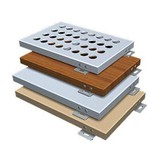Hey there! As a supplier of PVDF Aluminum Coil, I often get asked this question: "Can PVDF Aluminum Coil resist acid and alkali?" Well, let's dive right into it and find out.
First off, let's talk a bit about what PVDF Aluminum Coil is. PVDF stands for Polyvinylidene Fluoride. It's a high - performance fluoropolymer that's used as a coating on aluminum coils. The PVDF Aluminum Coil we supply is known for its durability, weather resistance, and aesthetic appeal. It's widely used in various industries, from architecture to automotive.


Now, when it comes to acid and alkali resistance, PVDF Aluminum Coil has some pretty impressive properties. PVDF is inherently resistant to a wide range of chemicals, including many acids and alkalis. This is because of its unique molecular structure. The carbon - fluorine bonds in PVDF are extremely strong, which makes the polymer stable and less reactive with other substances.
Let's start with acid resistance. In general, PVDF Aluminum Coil can withstand exposure to weak to moderately strong acids. For example, it can handle acetic acid, which is commonly found in vinegar. This acid resistance is a huge advantage in environments where there might be occasional acid spills or fumes.
Take the food processing industry, for instance. There are often acidic cleaning agents used to sanitize equipment. PVDF Aluminum Coil can be used in the construction of storage tanks or processing equipment because it won't corrode easily when in contact with these acids. It also holds up well against sulfuric acid in diluted forms. This is important in industries like battery manufacturing, where sulfuric acid is a key component.
However, it's important to note that PVDF Aluminum Coil has its limits. Concentrated acids, especially those with high oxidizing properties like nitric acid, can cause damage over time. Prolonged exposure to very strong acids can lead to discoloration, degradation of the coating, and eventually, corrosion of the underlying aluminum. So, while it's resistant to many acids, we need to be realistic about its capabilities.
Now, let's move on to alkali resistance. PVDF Aluminum Coil also shows good resistance to alkalis. Weak to moderately strong alkalis, such as sodium hydroxide in low concentrations, don't pose a significant threat to the PVDF coating. This is beneficial in industries like wastewater treatment, where alkaline substances are used for pH adjustment.
In addition, in the textile industry, alkaline dyes and processing agents are commonly used. PVDF Aluminum Coil can be used in the machinery and equipment involved in these processes because it can resist the corrosive effects of these alkalis. But just like with acids, highly concentrated alkalis can be a problem. Strong alkalis can react with the PVDF coating under certain conditions, leading to peeling or deterioration.
The acid and alkali resistance of PVDF Aluminum Coil also depends on other factors. Temperature plays a crucial role. Higher temperatures can accelerate chemical reactions. So, even if the PVDF Aluminum Coil can resist a certain acid or alkali at room temperature, it might not perform as well at elevated temperatures.
The duration of exposure is another important factor. A short - term exposure to a relatively strong acid or alkali might not cause significant damage, but long - term exposure can gradually break down the PVDF coating. The surface finish of the coil also matters. A smooth and uniform coating is more likely to provide better resistance compared to a coating with defects or uneven thickness.
In our experience as a supplier, we've seen PVDF Aluminum Coil perform well in many real - world applications. We've had customers in the chemical industry who use our coils in storage facilities for various chemicals, and they've reported minimal corrosion issues. In the architectural field, buildings with PVDF - coated aluminum facades have withstood the test of time, even in areas with slightly acidic or alkaline air pollution.
To ensure the best performance of PVDF Aluminum Coil in acid - and alkali - prone environments, proper installation and maintenance are essential. During installation, it's important to avoid any damage to the PVDF coating. Even a small scratch can expose the underlying aluminum to corrosive substances. Regular cleaning and inspection can also help detect any early signs of damage.
If you're in an industry where acid and alkali resistance is a key requirement, PVDF Aluminum Coil could be a great choice for you. But it's always a good idea to consult with us, the suppliers. We can provide more detailed information based on your specific application and the chemicals you'll be dealing with.
In conclusion, PVDF Aluminum Coil has good acid and alkali resistance, but it's not invincible. It can handle a wide range of weak to moderately strong acids and alkalis, making it suitable for many industries. However, we need to be aware of its limitations and take proper precautions to ensure its long - term performance.
If you're interested in learning more about our PVDF Aluminum Coil or have any questions about its acid and alkali resistance, feel free to reach out to us. We're here to help you make the right choice for your project. Whether you're building a new factory, renovating an existing facility, or working on a small - scale DIY project, we can provide the PVDF Aluminum Coil that meets your needs. So, don't hesitate to contact us for a quote or to discuss your requirements further.
References:
- "Fluoropolymers: Chemistry and Applications" by Amedeo A. Grassi and Giuseppe Malinconico
- Industry reports on the use of PVDF - coated materials in chemical and architectural applications.




